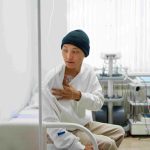The First Signs
Waiting. Waiting. Waiting.
It is perhaps the hardest, yet least acknowledged part of the cancer journey—painful, emotionally draining, and deeply stressful.
The waiting begins when a patient first notices a change: a lump, a growth, a symptom. Something that feels off and triggers an inner alarm—could this be serious?
They need to see a doctor to put their mind at ease. At this point, some may already suspect or fear the worst: is it cancer? So, when should they consult a doctor? Immediately. But often, the patient thinks… maybe I can *wait*.
The News & the System
Once doctors confirms a cancer diagnosis, some patients may be palliative or reach the end-of-life stage. The majority of patients rely on government hospitals for care. Over the years, the rising number of cancer cases has put immense pressure on available resources.
Machines used for biopsies, scans, MRIs, PET scans, and surgeries are in high demand.
As a result, the waiting time to access these services has grown significantly.
The Diagnostic Stage
After the first consultation, the doctor may schedule a series of tests—biopsies, scans, and bloodwork—before making a diagnosis.
This stage is filled with more *waiting*.
Going home with various instructions regarding investigations, tests or biopsies can instill fear or uncertainty which can be deeply traumatic. Not every test confirms cancer, but when it does, the doctor will explain the diagnosis and treatment plan. Patients may be told about upcoming surgeries, chemotherapy, or radiotherapy.
Financial Strain & Caregiver Limitations
Once treatment plans and timelines are laid out, patients may struggle to follow through.
Why? Often due to a lack of finances—even in government hospitals. Because even in government hospitals certain services and procedures are charged.
Some must consider home responsibilities—caring for children or elderly parents.Others face caregiver constraints. If their caregiver can’t take time off or manage the logistics, this too causes more *waiting*.
In my experience, I have seen delays of one to three years. Some patients, sadly, never return to complete treatment.
Facing the Decline
Caregivers also carry burdens and must balance their own lives.
Patients are sometimes left alone, facing their next appointment in solitude. Those in palliative may want care to stop treatments, sensing the end is near. The way a patient chooses to end their journey varies greatly.
*Waiting*—this time marked by pain, hair loss, mood swings, having to use stoma bags, loss of a breast, disfigurement and fear about financial resources—can feel overwhelming. External voices—neighbours, friends, myths—often add confusion and despair.
Moments of Grace
Some patients, a rare few, walk through this path with little distress.
They return to work, attend treatments, and carry on. Everyone journeys differently. I read multiple books at once. A fun one I can finish in days, another takes weeks, and one might stretch for months.
Sleeping, resting or doing nothing is also beneficial.
I’ve documented recipes from my cancer journey, especially my son’s favourites. sudoku, music, cooking, watching TV—these small things help pass the *waiting*.
The Emotional Load
We must also remember that some are bedridden, in pain, unable to speak.
Even a conversation, a shared song, or a gentle hug can bring light into that space. *Waiting* can be lonely, but shared moments make a difference.
All journeys end eventually. How we walk that path is ours to decide. Let’s appreciate those who stay close and comfort us in these final chapters of their cancer journey. That’s when we learn who our true friends and family are. And sometimes strangers surprises us with kindness and love.
The Unspoken Truth
How do most cancer patients handle *waiting*?
Truthfully, we do nothing.
We are frightened, stressed, fearful, and unsure of what the future holds.
We hesitate to express this burden because our families are already doing so much.
We don’t want to add to their load. So we stay quiet—and *WAIT*






